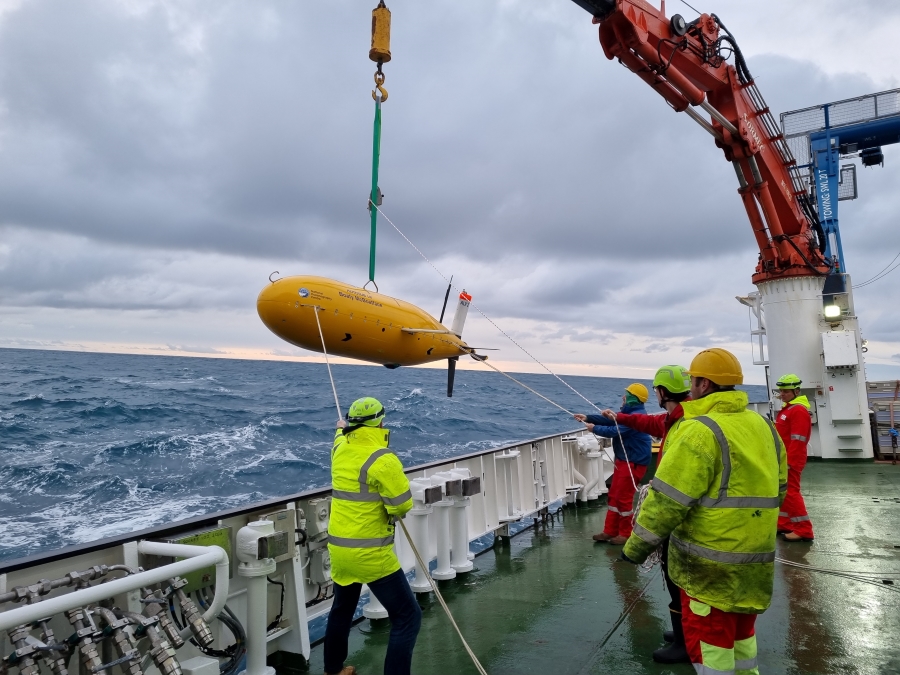Published:

Researchers at the Lyell Centre, a Global Research Institute for Earth and Marine sciences based at Heriot-Watt University, have been awarded £2.2m by UKRI (UK Research and Innovation) to explore how ecological interactions influence the oceans’ ability to absorb carbon dioxide.
Led by Professor Alex Poulton, in partnership with the Norwegian Research Centre (NORCE), the Universities of Strathclyde, Exeter, East Anglia and Southampton, the NOC (National Oceanography Centre) and Plymouth Marine Laboratory, the three-year CHALKY (Coccolithophore controls on ocean alkalinity) project will examine the ecology of coccolithophores, unique microscopic algae who form calcium carbonate scales through calcification.
This process of calcification affects the pH levels of the ocean by consuming alkalinity, influencing the capacity of the ocean to absorb CO2 and, in certain conditions, such as viral infection or a lack of nutrients, the algae can shed their scales in their thousands – known as ‘blooms’ - turning the waters turquoise to such an extent it can be detected from space.
The CHALKY project aims to explore the effects of ‘coccolithophore blooms’ and how the fate of the calcium carbonate formed is impacted by the behaviour of marine viruses and grazing by zooplankton and microscopic animals. The project will also examine how other organisms, such as foraminifera and pteropods (sea snails), contribute to calcium carbonate formation, and the fate of that material.
The ocean absorbs a quarter of all carbon dioxide emissions from the atmosphere and I have studied the behaviour of plankton and how it affects this CO2 absorption throughout my career.
This research will, for the first time, quantify these various biological processes to better understand the role of coccolithophores in reducing the capacity of the ocean to remove CO2 from the atmosphere, and how this could be potentially altered by climate change. Currently, estimates are very uncertain due to insufficient knowledge about these key calcium carbonate processes (production, consumption, retention and removal) and how these vary seasonally and globally. Tracking the impact of these marine organisms on carbon storage can help improve climate modelling and predictions.
This ambitious project is being funded alongside two other studies as part of BIO-Carbon (Biological Influence on Future Ocean Storage of Carbon), a strategic research programme supported by UKRI’s NERC (Natural and Environmental Research Centre) to address pressing questions on how marine life helps the ocean store huge amounts of carbon dioxide that would otherwise be in the atmosphere. Emerging evidence indicates that current climate models do not fully account for the impact of marine organisms, and we urgently need to understand the role of biology in these processes.
CHALKY will address Challenge One identified within the interlinked programme, which focuses on how marine life affects the potential for seawater to absorb CO2.
The other projects are PARTITRICS (Particle transformation and respiration influence on ocean carbon storage), which will use shipboard observations and autonomous underwater vehicles (AUVs) to seek to answer how organic matter is transformed through interactions between particles and organisms; and IDAPro (Integrating Drivers of Atlantic Productivity), which will use a combination of ship-based, robotic and satellite platforms to improve the understanding of the productivity of phytoplankton. Prof. Poulton will also support the IDAPro project as a Co-Investigator.
All three projects will join together on a research ship expedition next spring, departing from Southampton and travelling to Iceland. The expedition will incorporate the use of AutoSub – aka ‘Boaty McBoatface’ – equipped with novel chemical and biological sensors, and use these alongside satellites and robotic Bio-ARGO floats to gather further data for the different projects.
Prof. Poulton said: “It is a thrill to be part of the BIO-Carbon programme, working closely with other esteemed universities and research institutes to better understand the impacts of biodiversity and marine life in our waters.
“The ocean absorbs a quarter of all carbon dioxide emissions from the atmosphere and I have studied the behaviour of plankton and how it affects this CO2 absorption throughout my career. Having the opportunity to combine scientific research with the latest in autonomous marine technology, satellites and sensors offers a unique opportunity to gather data and understand our oceans better.”
Adrian Martin, champion of the BIO-Carbon programme said: “With countries striving for net-zero carbon and debate ongoing over whether we can use the ocean to remove excess carbon dioxide from the atmosphere, the need to understand how the ocean stores carbon has never been stronger and we know that marine life plays an important role.
“These three exciting projects will use an ambitious combination of research vessels and marine robots. Together they will deliver fundamental insights into how ocean organisms will help it continue to store carbon as the climate changes.”
As well as its UK partners, CHALKY is also collaborating with several international universities and research institutes, including Bigelow Laboratory for Ocean Sciences (US) and the Universities of Ghent (Belgium), Goethe (Frankfurt), Antofagasta (Chile), Concepcion (Chile) and Oregon State (US).